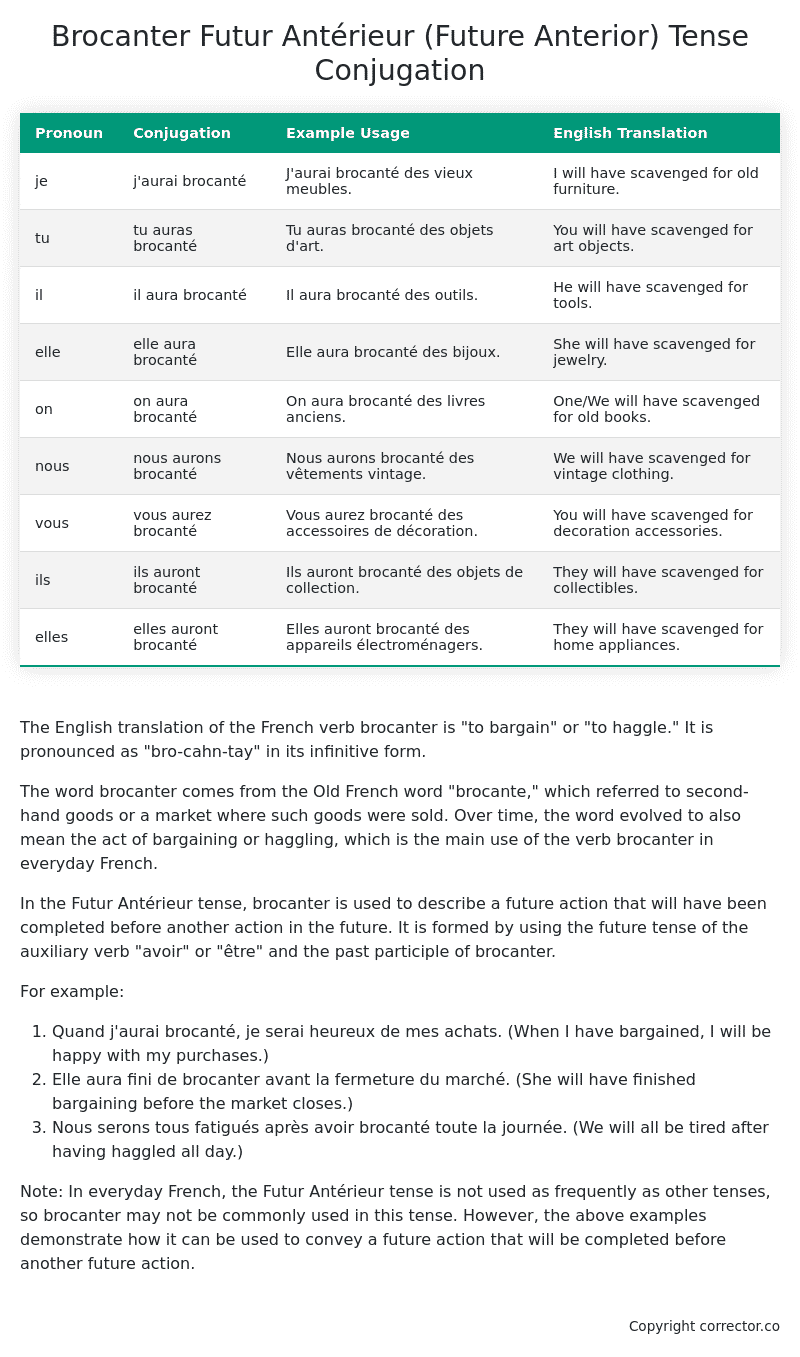Futur Antérieur (Future Anterior) Tense Conjugation of the French Verb brocanter
Introduction to the verb brocanter
The English translation of the French verb brocanter is “to bargain” or “to haggle.” It is pronounced as “bro-cahn-tay” in its infinitive form.
The word brocanter comes from the Old French word “brocante,” which referred to second-hand goods or a market where such goods were sold. Over time, the word evolved to also mean the act of bargaining or haggling, which is the main use of the verb brocanter in everyday French.
In the Futur Antérieur tense, brocanter is used to describe a future action that will have been completed before another action in the future. It is formed by using the future tense of the auxiliary verb “avoir” or “être” and the past participle of brocanter.
For example:
- Quand j’aurai brocanté, je serai heureux de mes achats. (When I have bargained, I will be happy with my purchases.)
- Elle aura fini de brocanter avant la fermeture du marché. (She will have finished bargaining before the market closes.)
- Nous serons tous fatigués après avoir brocanté toute la journée. (We will all be tired after having haggled all day.)
Note: In everyday French, the Futur Antérieur tense is not used as frequently as other tenses, so brocanter may not be commonly used in this tense. However, the above examples demonstrate how it can be used to convey a future action that will be completed before another future action.
Table of the Futur Antérieur (Future Anterior) Tense Conjugation of brocanter
| Pronoun | Conjugation | Example Usage | English Translation |
|---|---|---|---|
| je | j’aurai brocanté | J’aurai brocanté des vieux meubles. | I will have scavenged for old furniture. |
| tu | tu auras brocanté | Tu auras brocanté des objets d’art. | You will have scavenged for art objects. |
| il | il aura brocanté | Il aura brocanté des outils. | He will have scavenged for tools. |
| elle | elle aura brocanté | Elle aura brocanté des bijoux. | She will have scavenged for jewelry. |
| on | on aura brocanté | On aura brocanté des livres anciens. | One/We will have scavenged for old books. |
| nous | nous aurons brocanté | Nous aurons brocanté des vêtements vintage. | We will have scavenged for vintage clothing. |
| vous | vous aurez brocanté | Vous aurez brocanté des accessoires de décoration. | You will have scavenged for decoration accessories. |
| ils | ils auront brocanté | Ils auront brocanté des objets de collection. | They will have scavenged for collectibles. |
| elles | elles auront brocanté | Elles auront brocanté des appareils électroménagers. | They will have scavenged for home appliances. |
Other Conjugations for Brocanter.
Le Present (Present Tense) Conjugation of the French Verb brocanter
Imparfait (Imperfect) Tense Conjugation of the French Verb brocanter
Passé Simple (Simple Past) Tense Conjugation of the French Verb brocanter
Passé Composé (Present Perfect) Tense Conjugation of the French Verb brocanter
Futur Simple (Simple Future) Tense Conjugation of the French Verb brocanter
Futur Proche (Near Future) Tense Conjugation of the French Verb brocanter
Plus-que-parfait (Pluperfect) Tense Conjugation of the French Verb brocanter
Passé Antérieur (Past Anterior) Tense Conjugation of the French Verb brocanter
Futur Antérieur (Future Anterior) Tense Conjugation of the French Verb brocanter (this article)
Subjonctif Présent (Subjunctive Present) Tense Conjugation of the French Verb brocanter
Subjonctif Passé (Subjunctive Past) Tense Conjugation of the French Verb brocanter
Subjonctif Imparfait (Subjunctive Imperfect) Tense Conjugation of the French Verb brocanter
Subjonctif Plus-que-parfait (Subjunctive Pluperfect) Tense Conjugation of the French Verb brocanter
Conditionnel Présent (Conditional Present) Tense Conjugation of the French Verb brocanter
Conditionnel Passé (Conditional Past) Tense Conjugation of the French Verb brocanter
L’impératif Présent (Imperative Present) Tense Conjugation of the French Verb brocanter
L’infinitif Présent (Infinitive Present) Tense Conjugation of the French Verb brocanter
Struggling with French verbs or the language in general? Why not use our free French Grammar Checker – no registration required!
Get a FREE Download Study Sheet of this Conjugation 🔥
Simply right click the image below, click “save image” and get your free reference for the brocanter Futur Antérieur tense conjugation!

Brocanter – About the French Futur Antérieur (Future Anterior) Tense
Construction
Common Everyday Usage Patterns
Interactions with Other Tenses
For example
Summary
I hope you enjoyed this article on the verb brocanter. Still in a learning mood? Check out another TOTALLY random French verb conjugation!


